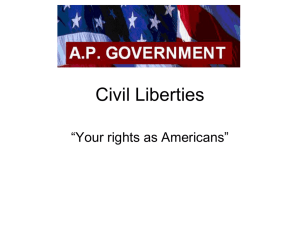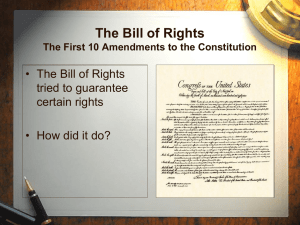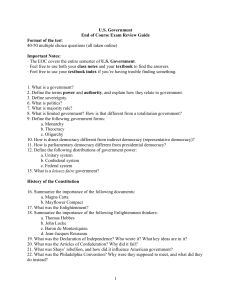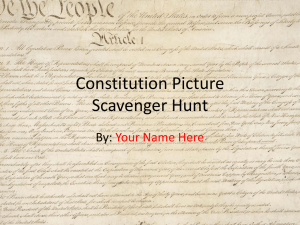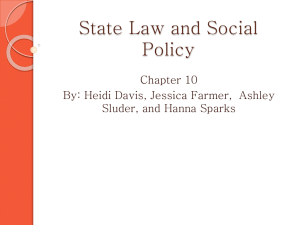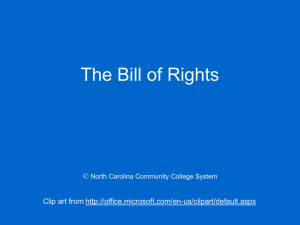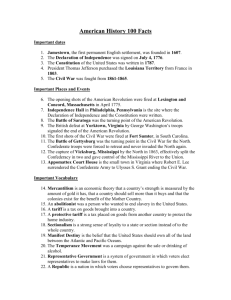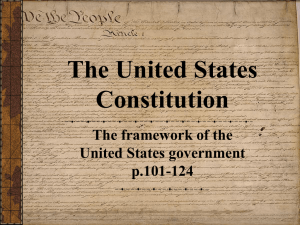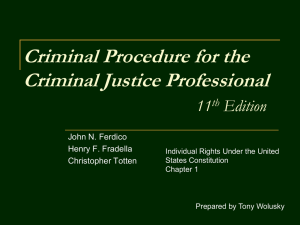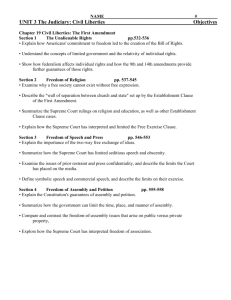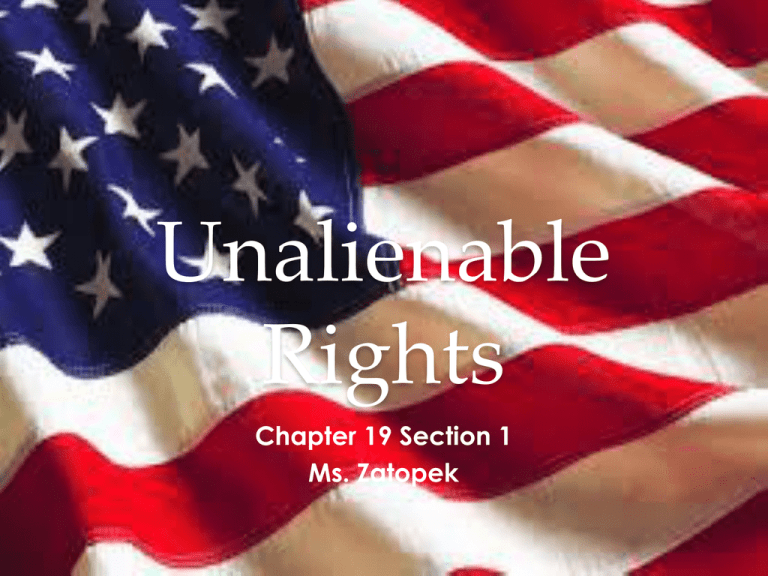
Unalienable
Rights
Chapter 19 Section 1
Ms. Zatopek
Why?
• The United States was founded, in part, to
ensure individual rights against the power of
government.
• However, these rights can be restricted when
they come into conflict with the rights of others.
• The Due Process Clause of the 14th
Amendment prevents the States from abridging
rights guaranteed in the Constitution’s Bill of
Rights.
Commitment to Freedom
Beginning with the early struggle of colonists to gain
and protect their individual rights.
Declaration states:
“All men are created equal,
they are endowed by their
Creator with certain
unalienable rights..”
Constitution did not have
a listing of the rights of
the people so then
Congress proposed a
series of amendments
guaranteeing basic rights
and liberties known as
the Bill of Rights.
Civil Liberties vs.
Civil Rights
Liberties: Are protections
against government.
Guarantees of the safety of
persons, opinions, and
property from arbitrary acts
of government.
Examples: Freedom of
Religion, Freedom of Speech
and Press, Guarantee of a
fair trial.
Rights: positive acts of
government that seek to
make constitutional
guarantees a reality for all
people.
Examples: Prohibitions of
discrimination on the basis
of race, sex, religious
belief, or national origin.
Civil Rights Act of 1964.
Limited Government =
Personal Freedoms
The US Government is limited. Each one of
our guarantees of personal freedom is either
an outright prohibition or restriction on the
power of government to do something.
Rights are Relative, Not Absolute!
The Constitution guarantees many rights to everyone,
Still no one has the right to do anything they want
that would infringe on the rights of others.
Example: Freedom of Speech
But this freedom is not protected if it causes harms to
others.
“The most stringent protection of free speech would
not protect a man in falsely shouting fire in a
theatre and causing a panic.”
-Schenck v United States, 1919:
Rights that Conflict
Example: Sheppard v Maxwell,
1966
Freedom of press vs Right to a
fair trial
• Dr. Sheppard was convicted
of murder. His trial was
widely covered by the
national media.
• Appeal: Sheppard claimed
the highly sensational
coverage had denied him a
fair trial.
• Supreme Court overturned
Sheppard’s conviction and
ordered a new trial.
Guaranteed Rights to Whom?
Rights are extended to all persons
Persons meaning all citizens and aliens
(not citizens of the country in which
you live in).
However some rights are not given to aliens such as
the right to travel freely throughout the country is
guaranteed to all citizens. Travel is restricted for
aliens.
Bill of Rights
1st Ten Amendments were
originally intended as
restrictions on the United
States Government not on
the existing States.
Example: 5th amendment
says no person can be
charged with a capital
crime except by a grand
jury. However the States
are free to use the grand
jury to bring accusations
of a serious crime.
Due Process Clause –
Modified 14th Amendment
“No State shall .. Deprive
any person of life,
liberty, or property,
without due process of
law.”
In other words : No State
can deny to any
person any right that is
basic or essential to the
American concept of
ordered liberty.
• Process of incorporation:
incorporated most of the
guarantees in the Bill of
Rights into the 14th
Amendment’s Due
Process Clause.
• Gitlow v New York, 1925:
a communist who had
been convicted in the
State courts of criminal
anarchy (several
speeches and pamphlet
for violent overthrow of
gov’t)
9th Amendment
“ The enumeration in the Constitution, of certain rights, shall not be construed
to deny or disparage others retained by the people.”
NOWHERE in the Constitution, or anywhere else, is there a
complete list of all of the rights held by the American
people.
9th Amendment declares there are rights beyond those set
out in so many words in the Constitution.
Supreme Court has found a number of other rights that are
“retained by the people” such as the guarantee an
accused person will not be tried on the basis of
evidence unlawfully gained, or the right of a woman to
have an abortion without the undue interference of the
government.
Things to Remember
The Bill of Rights grant freedoms to persons of the
United States by limiting the national government’s
power not the States’ power.
Civil Liberties are protections from the government
and Civil Rights are positive acts by the
government.
Rights are relative not absolute. Don’t infringe upon
others’ rights.
No state can deny any person any right that is
essential to ordered liberty- Due Process Clause.
9th Amendment claims there are rights beyond
those set out in many words of the Constitution.
Sources
Textbook:
McClenaghan, William A., and Frank Abbott
Magruder. Magruder's American Government.
Needham, MA: Prentice Hall, 2003. Print.
Use the following website for help citing your sources:
www.easybib.com

